Crocs, cattle and canapes in the Top End
Take an exclusive peek at a posh new lodge in the wet and wild Northern Territory.
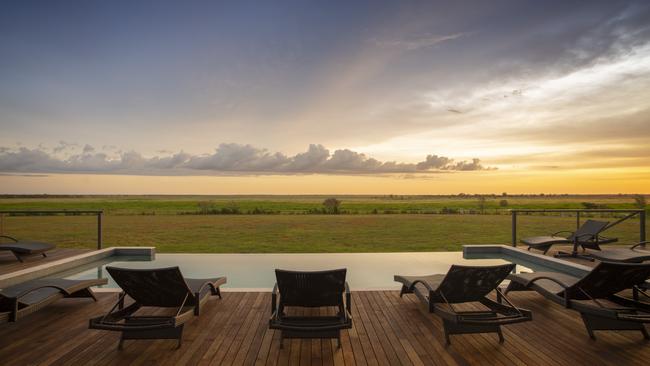
A herd of Brahman cattle is surging towards me at an alarming pace, a cloud of dust rising in their wake. Dozens of poddy calves are at their heels, gambolling higgledy-piggledy and adding to the sense of chaos. It would be unnerving but for the cattle’s enormous ears, which flap comically in time with their dewlap, the skirt of skin that hangs from their necks and swings from side to side. They look like a very large litter of overexcited puppies. Rather than bowl me over, they pull up short, inserting their leathery noses hungrily into piles of pellets.
Among the 6500 head of stock at Finniss River Station, a 22,250ha property about 90 minute’s drive southwest of Darwin, these are a pampered bunch. They’re a mix of breeding animals and others that have been abandoned or orphaned. My host, Olivia Venturin, granddaughter of the station’s original owner, helps to nurse them back to good health, and ensures they are branded with an infinity symbol that means they’ll never be shipped off to the meat markets of Indonesia or Malaysia.
As she gives a honey-hued heifer an ear scratch, Olivia introduces two other guests and me to Warty, a friendly chap who had an unfortunate skin condition when he was found without his mum. His coat is now smooth and silvery, and he seems far more interested in pats from humans than bickering with his bovine cohort for a share of the snacks.
This sunset outing, called Cows and Canapes, is one of the guest experiences at the newly opened Finniss River Lodge. As the cattle mill about, we sip glasses of chilled white wine and nibble skewers of grilled crocodile topped with finger lime, bite-sized buffalo tartare, and mini croissants filled with cucumber and cream cheese. When our four-legged friends lose interest and wander off, we pile into all-terrain vehicles for the ride back to our accommodation, a string of six luxury suites.
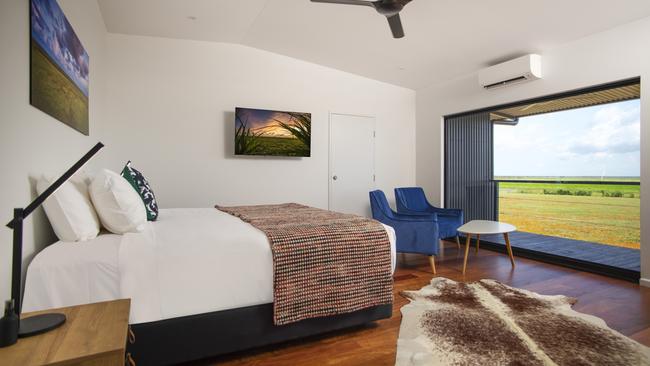
From a distance, the lodge looks more functional than fancy, housed in a long shed-like structure clad in dark Colorbond. But looks can be deceiving. Each suite is a spacious airconditioned sanctuary of polished bluegum floors with king bed, velvet armchairs, smart TV and private balcony. The monochromatic bathroom is huge and features brass tapware, rainshower and a deep tub ideal for washing off the day’s adventures with Li’Tya amenities. In the long walk-in wardrobe is an espresso machine, a minibar stocked with craft beer and softies, and jars of leaf tea as pretty as potpourri.
To dine, drink and socialise, guests stroll down the rear deck to a communal zone with leather lounges, dining hall and bar, stocked with plenty of local tipples such as Willing gin. A wall of French doors leads out to a vast hardwood deck where a sparkling swimming pool offers welcome relief to the Territory’s heat. Overall, the impression is of quality finishes and generous proportions, so generous in fact the interiors seem a little spartan. A few more decorative additions, a rug here or there, would help to fill the space and create a more homely ambience.
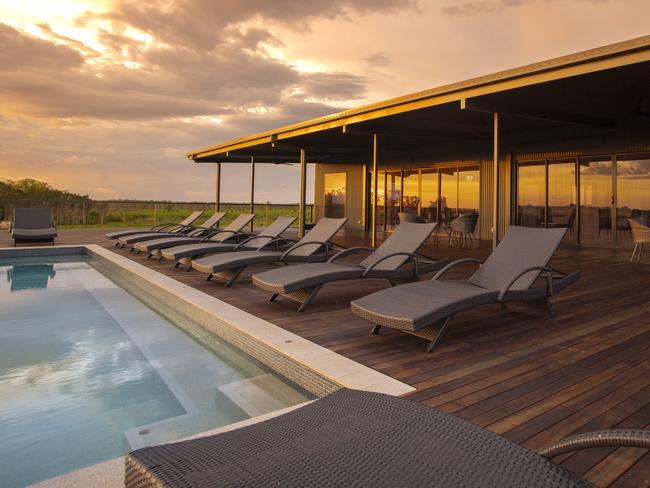
But why look in when you can look out? The lodge is perfectly poised for views over Labell Swamp, a veritable ocean of lime-green grasses. If I were to attempt to walk across it, in the absence of any Moses-like powers (or, more importantly, crocodile deterrents) I’d soon be up to my thighs in water. In the months ahead as the dry season bites, the marshland will drain and more of the NT’s abundant birdlife will appear.
We take an ATV tour to a lookout with eagle-eyed guide Chase Johnson, a woman hailing from Humpty Doo with a smile as broad as her Aussie accent. Legendary in these parts for her work with crocs, she is a walking encyclopedia on all manner of topics. Her fascination with termite mounds is endearing. These structures cluster like ancient stone circles throughout the property’s paddocks, playing a crucial role in breaking down waste and providing shelter for small birds. Having spent some time in Indigenous communities, Chase understands the way First Nations people traditionally read the land to determine the change of seasons and find food and water.
These environmental signals remain relevant to locals. The woollybutt, for instance, is a “calendar tree” that heralds the arrival of cooler weather.
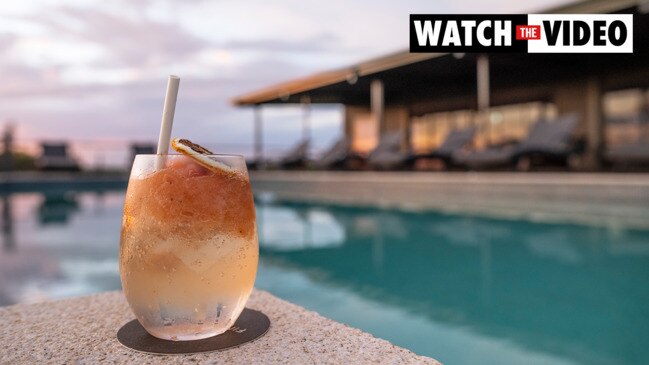
“The day they go into flower, that’s the day we put our woolly jumpers on,” Chase says. She stops the ATV near a turkey bush, a common shrub that has recently started sprouting starbursts of fine pink petals; it’s a sign the NT’s peak tourist season has begun.
We drive through the savannah woodlands, past stands of grevillea, their silvery leaves shining in the sunlight, tangerine blossoms bobbing on the breeze. Normally at this time of year, the sky is an unbroken canvas of pure blue but today it’s rippled with clouds like a beach at low tide. Even in the Top End, the weather is becoming unpredictable.
Chase swings off piste through the bullrushes en route back to the lodge for lunch. We’ve barely gone a hundred metres when she applies the brakes sharply and exclaims: “Brolgas!” Sure enough, a pair of long-legged, elegant grey birds is picking through the shallows for food. The male raises his mighty wings and makes a half-hearted effort to dance for his girlfriend. Given the duo are already an item, he probably doesn’t have to try too hard; brolgas mate for life. Minutes later, we are again peering keenly through binoculars at two jabiru, with black and white bodies and shiny blue-green feathers on their necks and head. In a matter of weeks, this area could have dozens of pairs strutting their stuff, not to mention noisy hordes of magpie geese, peewees and egrets.
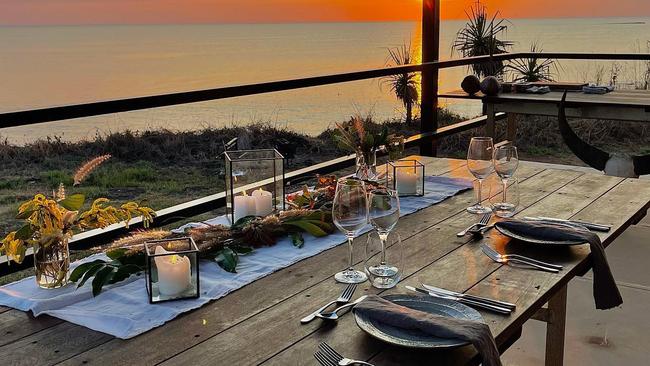
Back at base, resident chef Travis Crane, formerly of City Winery Restaurant in Brisbane, spends his days conjuring magic tricks in the kitchen. His imaginative alchemy of cooking with fire, preservation methods such as fermentation and ageing, and focus on sustainability makes every meal an adventure. An entree of prawn and green-ant ceviche with paw paw sorbet, perhaps? Lunch? How about flame-smoked pumpkin with buckwheat, broccolini and goats cheese? Dessert? Nothing beats Travis’s apple tarte tatin, served with a shot of Tassie’s Cape Grim vodka.
One afternoon we climb aboard the ATVs for a brief diversion to a stand of melaleuca, where Travis uses his Dundee-style “that’s not a knife” blade to peel sheets of paperbark from a trunk. That evening he serves an inventive version of meat and potatoes, having char-roasted kipflers in the bark with onion and garlic before tossing in yeasty butter and sherry vinegar. Here is a chef who has thrown himself with gusto into the Top End playground and discovered an abundance of toys.
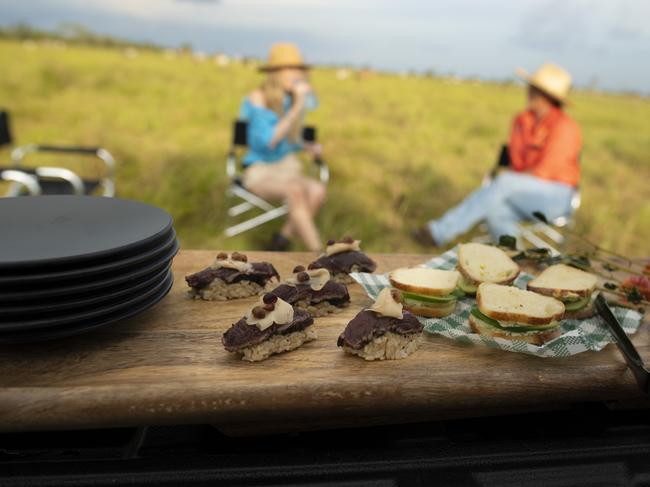
Leo Venturin, an Italian immigrant who found success in the building business from Alice Springs to Darwin, fulfilled a long-held dream to run cattle when he acquired Finniss River Station in 1987. He’s now in his 80s, and son Rob helms the farm. It’s a huge property that spans beachfront, floodplains, savannah and pockets of remnant rainforest. And it has good neighbours, too. “Outback wrangler” Matt Wright’s popular Top End Safari Camp is next door. The Venturins and the TV star have a comfortable quid pro quo arrangement whereby feral pigs that encroach on their pastures are dispatched then gifted to some of Wright’s 4m-long reptilian residents.
Finniss River has the third-highest density of estuarine crocodiles in the world; a census conducted one night on a 7km stretch recorded an astonishing 130 salties. The waterway’s most famous inhabitant was Sweetheart, a 5m specimen that ended up in Darwin’s museum after an attempt to relocate him in the 1970s went awry. Lodge guests have the chance to get remarkably close to these apex predators on an early morning airboat safari at Wright’s place.
At dawn the lilac sky is alive with fairy martins whirling in an insect feeding frenzy. Egrets tip-toe delicately across the lawn while, in the distance, cattle are groaning in their overnight camp among the paperbarks. The lodge’s co-manager Jordyn Tas drives us to the safari camp pontoon where guide Rowdy (a softly spoken fellow and a Chase Johnson alumni) welcomes us aboard. We motor slowly to Sweets Lagoon, its surface a mirror of green and gold. A juvenile croc observes us warily from afar as we admire the nest of a white-breasted sea eagle. Rowdy explains how the female rules the roost and will rip out any of the male’s renovations that don’t meet her exacting standards. There are about eight nests dotted around the lagoon, evidence of the rich pickings to be had in waters brimming with turtle and fish.
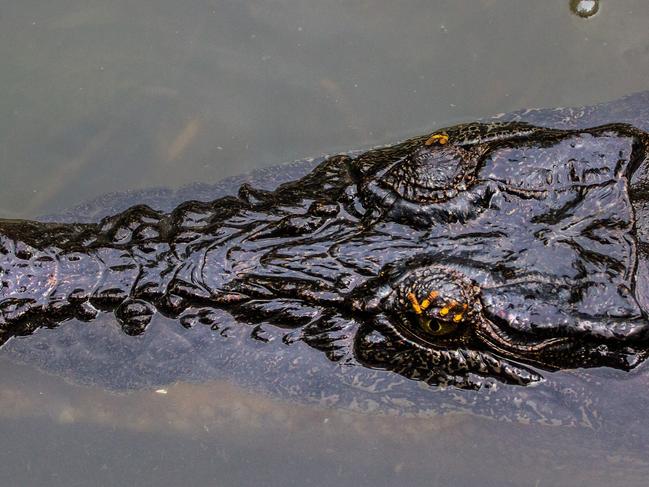
Rowdy fires up the engine and turns the airboat down a narrow waterway thick with bullrush. Vegetation and submerged logs are no obstacle as we skim the surface, weaving past skeletons of fallen trees. Black darters erupt into the sky. Coming to a stop, a telltale bump heads towards us through the water, its sinuous body creating a perfect “v” in the reflected sunlight. Bonecrusher is well known to Rowdy, who summons the 4m monster to the airboat’s bow for a scratch and so he can show us his misshapen lower jaw, damaged in what must have been a mighty battle.
Further on we meet Nitro, described by Rowdy as one of the more violent crocs in the area until he, too, suffered injuries in a brawl with another male. “During the wet season, it’s all over women and territory,” he says, adding wryly, “it’s a bit like going down Mitchell St in Darwin on a Friday night.”
I’m pleased to see Nitro’s girlfriend is relaxing nearby. There’ll be no fighting today. Birds are twittering in the dense foliage above us, and we keep our eyes peeled for a glimpse of the vibrant blue forest kingfisher. Rowdy eases the airboat back into motion, cranks up the pace and we zoom back through one of the territory’s most fascinating landscapes.
In the know
Finniss River Lodge is about 90 minutes’ drive southwest from Darwin. Price varies with the seasons; from $1200 a person a night, twin-share; two-night minimum. Includes all meals and selected beverages, plus two guided on-site tours and a 50-minute airboat experience for stays of three nights or more. Transfers from Darwin are available, $495 a person.
Dry season runs from April to November; wet season from December to March.
Penny Hunter was a guest of Finniss River Lodge and Tourism NT.


To join the conversation, please log in. Don't have an account? Register
Join the conversation, you are commenting as Logout